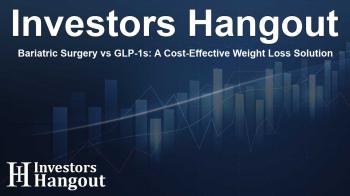Bariatric Surgery vs GLP-1s: A Cost-Effective Weight Loss Solution

Understanding the Cost and Effectiveness of Bariatric Surgery
Obesity has reached alarming levels, affecting 40% of adults in the United States. This has led to a rising reliance on medications known as GLP-1s for weight management. However, recent research highlights the substantial advantages of bariatric surgery over these drugs.
Recent Study on Bariatric Surgery and GLP-1 Medications
New findings from Highmark Health researchers indicate that bariatric surgery is not only more effective for weight loss but also cheaper in the long run when compared to GLP-1 medications. This thorough retrospective study involved analyzing insurance claims and medical records from over 30,458 patients treated recently.
What the Research Shows
The study investigated the healthcare costs and outcomes of patients who underwent metabolic bariatric surgery—like sleeve gastrectomy and gastric bypass—against those treated with GLP-1 receptor agonists for obesity management. The results showcased clear benefits for those who chose surgery.
Cost Benefits of Bariatric Surgery
One major finding noted that, within two years, patients who underwent surgery faced about 18% lower healthcare costs than those relying on GLP-1 medications. This amounted to an estimated savings of nearly $12,000 per patient, attributed to the high ongoing pharmacy costs associated with GLP-1 treatments.
Weight Loss Results
When it comes to weight loss, surgery proved to be significantly more effective. Patients with a BMI of 40 or more experienced nearly three times the weight loss compared to those on medications—averaging a 28% weight reduction versus about 10% from drugs.
Healthcare Utilization Trends
Another key observation from the study indicated that bariatric surgery led to 25% fewer inpatient stays and 38% fewer emergency room visits compared to GLP-1 treatment. Furthermore, patients who opted for surgical interventions saw a lower prevalence of obesity-related conditions such as sleep apnea and hyperlipidemia.
Insights from Healthcare Experts
Doctor Tyson S. Barrett from the Highmark Health Research Institute stated, "This study provides compelling evidence regarding the long-term effectiveness of bariatric surgery versus traditional weight management medications for individuals with severe obesity." This underscores the necessity for healthcare providers to have accurate and comprehensive data to guide their treatment decisions.
The Rise in Obesity Rates
Recent trends show that over 40% of the adult population in the U.S. struggles with obesity. The increasing popularity of GLP-1 medications as a weight management solution has resulted in a dramatic uptick in prescriptions—nearly 600% since 2019. This surge in demand represents a significant financial strain on health insurance providers.
Looking Ahead
Given projections that suggest half of the adult U.S. population will be obese by 2030, it's crucial for healthcare professionals to re-evaluate their strategies, factoring in both the cost and effectiveness of different treatments.
About Highmark Health and Its Role
Highmark Health, based in Pittsburgh, PA, is an influential health services organization that oversees a spectrum of healthcare solutions, including insurance and hospital services. Employing over 44,000 individuals, the organization brings care to millions across the nation and strives to remain at the forefront of addressing healthcare needs.
Frequently Asked Questions
What is bariatric surgery?
Bariatric surgery is a surgical procedure aimed at weight loss by altering the digestive system, typically performed on individuals with severe obesity.
How does bariatric surgery compare to GLP-1 medications?
Bariatric surgery generally results in greater weight loss and lower long-term costs compared to GLP-1 medications.
What are the potential risks of bariatric surgery?
As with any surgery, bariatric procedures come with risks, but they can provide significant health benefits that outweigh potential complications.
Can anyone undergo bariatric surgery?
Eligibility typically includes having a BMI of 30 or higher or suffering from obesity-related health conditions. Consulting a healthcare provider is crucial.
Where can I find more information on obesity and treatment options?
For detailed insights on managing obesity and available treatments, reaching out to healthcare providers or visiting health organizations is recommended.
About The Author
Contact Dylan Bailey privately here. Or send an email with ATTN: Dylan Bailey as the subject to contact@investorshangout.com.
About Investors Hangout
Investors Hangout is a leading online stock forum for financial discussion and learning, offering a wide range of free tools and resources. It draws in traders of all levels, who exchange market knowledge, investigate trading tactics, and keep an eye on industry developments in real time. Featuring financial articles, stock message boards, quotes, charts, company profiles, and live news updates. Through cooperative learning and a wealth of informational resources, it helps users from novices creating their first portfolios to experts honing their techniques. Join Investors Hangout today: https://investorshangout.com/
The content of this article is based on factual, publicly available information and does not represent legal, financial, or investment advice. Investors Hangout does not offer financial advice, and the author is not a licensed financial advisor. Consult a qualified advisor before making any financial or investment decisions based on this article. This article should not be considered advice to purchase, sell, or hold any securities or other investments. If any of the material provided here is inaccurate, please contact us for corrections.

